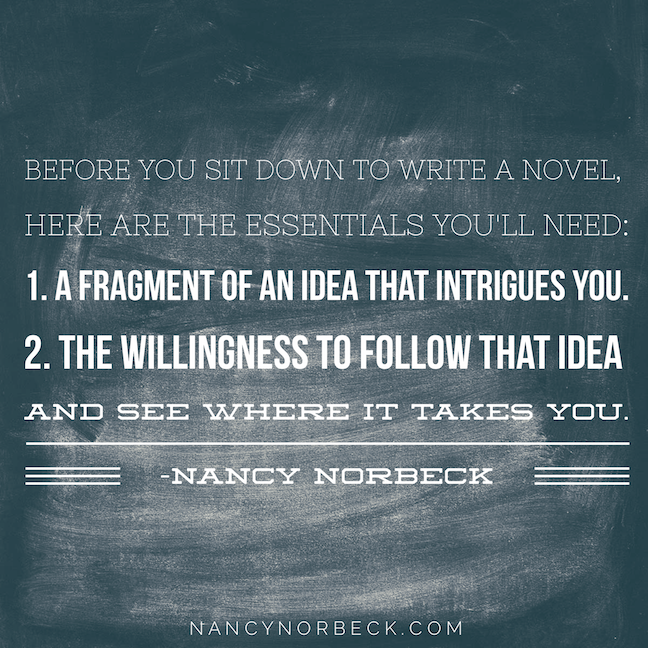I’ve been putting together two new Pinterest boards. One is a Creative Reminders Journal board, which consists of a lot of quotes and other ideas/practices that help me keep perspective on my process. The other is similar, but with a writing focus.
This morning, I found a pin that gave me pause. Here’s what it says:
Before you sit down to write a novel, here are the essentials you’ll need.
1. A knowable protagonist who will fascinate readers.
2. A problem that needs solving or a goal that needs reaching.
3. An understanding of your protagonist’s inner and outer desires.
4. An interesting, workable locale.
5. A menace/threat hanging over the protagonist.
6. An antagonist.
7. How it will all turn out.
—Jessica Page Morrell
With all due respect to Ms. Morrell, for whom I’m sure this list works, advice like this pushes my buttons.
Look at that list again and notice where your gut clenches. Pay attention to your body. It’ll give you a clear signal.
There are two super-basic types of writers. There are the plotters: the folks who have to have figured out every detail before they ever put pen to paper. And there are the “pantsers”: the folks who fly by the seat of their proverbial pants the whole way, and the come back at the end to see what they have and what needs to be done to make it hang together properly.
If you’re a plotter, the advice above will work fabulously for you. You may not have clenched at all.
If you’re a pantser, though—like me—I’m gonna bet that your gut tightened before you got halfway through.
Many of us look at this sort of list and despair not only that we’ll never be ready but that the goal itself is unattainable—that we are just not good enough to get there. We crumble under the pressure of words like “knowable” (what does that even mean??) and “fascinate.” How do we know what will fascinate a reader? Is my character fascinating enough? All I have is a name and a location and one weird little foible—how can I know if this character will be interesting at all?
People who write this sort of list tend to call it “tough love.” But too much tough love tends to make creative folks’ brains seize up. There’s so much to figure out before I start! I don’t know the answers, and I don’t know how to figure them out…so I guess I’ll go binge-watch 30 Rock instead.
(Yes, I know that her advice was given regarding NaNoWriMo. And yes, some people will have a much better chance of writing 50,000 words in 30 days if they know these things ahead of time. But not only do some people not need it, it just plain doesn’t work for them.)

There are a couple of things I want my fellow pantsers to know:
1. YOU ARE NOT ALONE.
Really. A lot of great writers start a book having absolutely no idea where they’re going. It’s entirely possible to start with a single line and end up with a totally workable book when you’re done. Don’t let anyone tell you otherwise.
For instance, E. L. Doctorow famously said, “Writing is like driving at night in the fog. You can only see as far as your headlights, but you can make the whole trip that way.” My guess is that Doctorow was a pantser.
Neil Gaiman: “This is how you do it: you sit down at the keyboard and you put one word after another until its done. It’s that easy, and that hard.” I could swear that I once read a comment on his blog saying that he’d finished a draft and had to “go back and make it look like he meant it that way,” though I’ve never been able to find it again. I suspect Gaiman is a pantser.
I can speak from the experience of writing a book that started with nothing more than a single line. It was my MFA thesis, so it had to come together in two years—or no diploma. (It did. You can read more about how that happened here.)
2. NO ONE WAY IS BETTER THAN ANOTHER.
Your high school English teacher told you to outline everything before you wrote it, and she had her reasons. One was that it was specified in the curriculum. It’s also true that structure often makes writing easier for new writers. But that doesn’t mean it’s the only way, or that it’s a better way. It means it’s one way that may work for you. If not, that’s okay, too.
There are actually dangers in being a plotter. One is that characters often take on lives of their own, deciding to do things differently than you outlined in your plot. If you’re fixated on your outline but your character has other ideas, your whole outline could be null and void. I’ve had characters argue with me about everything from their names to where they were from and what they did for a living. I’m not the only one.
The other is that you may have eliminated all surprise from your writing. In the words of Robert Frost: “No tears in the writer, no tears in the reader. No surprise in the writer, no surprise in the reader.”
In the end, the only right way is your way. Only you know what works for you. Here’s my answer to the list above.
Before you sit down to write a novel, here are the essentials you’ll need.
1. A fragment of an idea.
2. The willingness to follow that idea and see where it takes you.
I swear to you: that is ALL you need to get started. Doesn’t that feel better?

